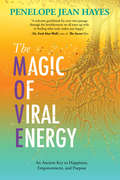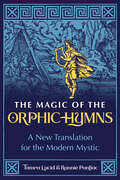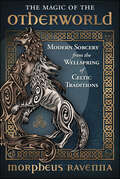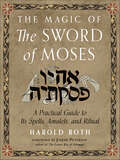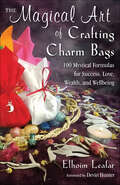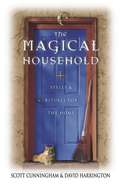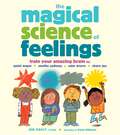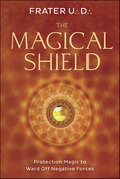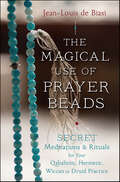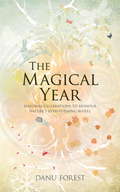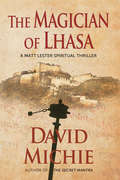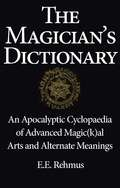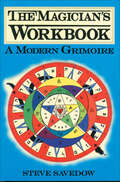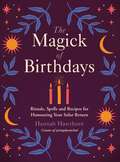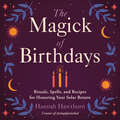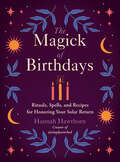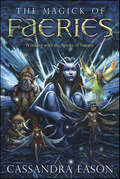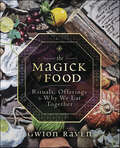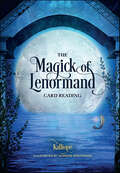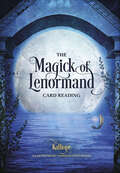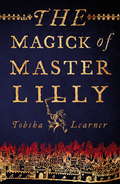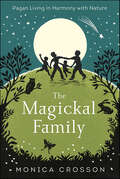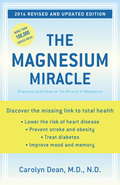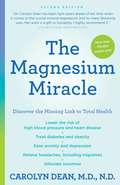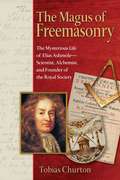- Table View
- List View
The Magic of Viral Energy: An Ancient Key to Happiness, Empowerment, and Purpose
by Penelope Jean HayesWant to find &“your person,&” improve your wellbeing, and be successful at your passions?The Magic of Viral Energy (MOVE) offers a fun and compelling narrative told through true short stories. Its message is for seekers—those intrepids who want to squeeze the lemons of life and discover their full potential.While meditating in 2007, Penelope Jean Hayes experienced the contagious nature of energy and a phenomenon she calls &“osmotic-energy-balancing.&” Over the next decade, she intuited a system of creation involving seven levels of energy ascending from dense and heavy upward to enlightenment.She shares that each of us has an energetic-presence that flows within one of these levels and that we only have access to the energies that reside there. Except that, we have the ability to move to higher strata, accessing the light energies that create more of what we truly want.MOVE reveals provocative insights into the universe; our relationships; the energetic antidote to unhappiness and the common cold; and our need to move from power-through-force to empowerment-through-creation. The Magic of Viral Energy is eye-opening and exciting and it makes day-to-day life easier and our big dreams possible.&“The Magic of Viral Energy could not be timelier, in my opinion. MOVE helps us recognize and understand ourselves. Viral energy is food for our soul—that&’s why it&’s magical.&” —Peter Egan, actor, Downton Abbey, Unforgotten, and Ever Decreasing Circles
The Magic of the Orphic Hymns: A New Translation for the Modern Mystic
by Tamra Lucid Ronnie PontiacRecaptures the magical vitality of the original Orphic Hymns• Presents literary translations of the teletai that restore important esoteric details and correspondences about the being or deity to which each hymn is addressed• Includes messages inscribed on golden leaves meant to be passports for the dead as well as a reinvention of a lost hymn to Number that preserves the original mystical intent of the teletai• Explores the obscure origins and the evolution of the Orpheus myth, revealing a profound influence on countercultures throughout Western historyAs famous Renaissance philosopher Marsilio Ficino wrote, &“No magic is more powerful than that of the Orphic Hymns.&” These legendary teletai of Orpheus were not simply &“hymns&”—they were initiatic poems for meditation and ritual, magical, and ceremonial use, each one addressed to a specific deity, such as Athena or Zeus, or a virtue, such as Love, Justice, and Equality. Yet despite the mystical concepts underlying them, the original hymns were formulaic, creating an obstacle for translators. Recapturing the magical vitality that inspired mystery cults through the ages, Tamra Lucid and Ronnie Pontiac present new versions of the teletai that include important esoteric details and correspondences about the being or deity to which each hymn is addressed. The authors also include a new version of a lost hymn called &“Number&” and messages that were inscribed on golden leaves meant to be passports for the dead, reinventions that preserve the original magical intent and mysticism of the teletai. Revealing the power of the individual hymns to attune the reader to the sacred presence of the Orphic Mysteries and the higher order of nature, the authors also show how, taken together, the Orphic Hymns are a book of hours or a calendar of life, addressing every event, from birth to death, and walking us through all the experiences of human existence as necessary and holy.
The Magic of the Otherworld: Modern Sorcery from the Wellspring of Celtic Traditions
by Morpheus RavennaBuild Your Own Magical Practice Rooted in Celtic TraditionsShaped by ancient and mythological texts, this book introduces you to a wellspring of Celtic magic and demonstrates how to apply these deep traditions to your unique, contemporary practice. Morpheus Ravenna helps you develop your skills from the ground up through rituals and deity work for healing, empowerment, justice, and more. With hands-on activities woven alongside history and lore from all over the Celtic world, you will master spiritual hygiene practices, protection methods, conflict magic, and a variety of other topics.Drawing upon polytheism, animism, and a connection to the Otherworld, Morpheus provides instructions for blessing water, conducting an ancestor elevation rite, beginning a spirit alliance, and creating a curse tablet. You will advance your sorcery through divination, sigil work, necromancy, and other techniques, developing more powerful expertise every step of the way.Includes a foreword by River Devora, a multi-traditional spirit worker, healer, clergyperson, and teacher
The Magic of the Sword of Moses: A Practical Guide to Its Spells, Amulets, and Ritual (Weiser Enochian Library)
by Harold RothA practical guide to the famed medieval book of pre-kabbalistic Jewish magic, freshly interpreted and revealed for the first time with instructions on how to use the spells. The Sword of Moses is one of the earliest Jewish magic books, which describes a rite for adjuring angels to assist in controlling and wielding the "Sword of Moses" for magical purposes. The rite involves a short period of purification and then the adjuring of four sets of angels, each higher than the last. These angels in turn give the magician the power to control the Sword through a series of divine names that work as magical spells. The spells, 137 in all, have a wide variety of uses, including healing, harm, love, sex, exorcising demons, divination, and more. This work was first translated by Moses Gaster in 1896, but he removed many of the spells, making the text unusable for magic. The Magic of the Sword of Moses is the first book to show in detail, exactly how a magician can use the Sword—how to do the purification ritual, adjure the angels, and pronounce and use the divine names for each spell.
The Magical Art of Crafting Charm Bags: 100 Mystical Formulas for Success, Love, Wealth, and Wellbeing
by Elhoim LeafarCharm bags, also known as mojo bags and gris-gris bags, may be the most popular style of amulet or talisman in the world today. Around the globe, they are crafted by people from many cultures and spiritual traditions and are created for many purposes. Until now there has been no definitive guide to the art of creating these magical power objects. The Magical Art of Crafting Charm Bags remedies this situation.Author Elhoim Leafar provides an introduction to the topic in this clear, focused book of practical magic, which features detailed instructions for making these bags. The strongest amulets are those you make yourself, and The Magical Art of Crafting Charm Bags shows you how. The Magical Art of Crafting Charm Bags contains 100 formulas intended for various purposes including love, luck, success, happiness, health, wealth, protection, prosperity, and the attainment of goals and desires. Based on an eclectic blend of Wicca, hoodoo, and Latin American folk magic, the book also contains extensive lists of herbs, gems and minerals, essential oils, astrological positions, and colors that contribute to making your own personal amulets. Instructions for casting circles and how to charge your charm bags are also included.
The Magical Household: Empower Your Home with Love, Protection, Health and Happiness
by Scott Cunningham David HarringtonRecognize and celebrate the magic of life with timeless rites and spells. Create a magical household--a haven of harmony, safety, spirituality, security, and romance. The benefits include a happier existence, protection against thieves, improved health, restful sleep, satisfying spiritual experiences, and a perfect environment for positive magic. This warm and wise guide by much loved author Scott Cunningham has been helping people create sacred space in their homes and gardens for nearly twenty years.
The Magical Science of Feelings: Train Your Amazing Brain to Quiet Anger, Soothe Sadness, Calm Worry, and Share Joy
by Jen DailyClinical social worker Jen Daily helps kids understand the science behind feelings, taking them on a lively tour of the brain to see where anger, anxiety, sadness, and joy start, and offering activities for calming emotions. Where do feelings come from? Are they magic? No, they're science! There is a reason our tummies feel funny when we are worried, and why we want to stomp and clench our fists when we feel mad. With endearing illustrations, the parts of the brain come alive as friendly characters who explain how emotions like happy, sad, mad, worried, and overwhelmed are created in the body. Along with clear explanations about the origins of feelings, author and clinical social worker Jen Daily provides creative coping skills and activities (playfully called emotion potions) that help build a child's ability to reflect, cope, calm anxious thoughts, and welcome greater joy. From dancing to storytelling and meditation, the coping skills are accessible and effective for a wide range of social-emotional needs and learning styles.
The Magical Shield: Protection Magic to Ward Off Negative Forces
by Frater U.:D.:Neutralize the forces of darkness with holistic security magicProtect yourself against psychic attacks, energy vampires, curses, and bewitchments. The practices in this book will work no matter what your personal beliefs or convictions. With creative approaches to extremely powerful magic, these easy-to-read teachings will show you how to work with:SigilsMantrasMudrasRitualsSpiritual alliesProtective entitiesBodily awarenessHabitsNegotiationSelf-assertivenessMental modelsYou don't have to commit to any specific religious or philosophical beliefs in order to conquer the negative energies and intentions that exist in our world. Simple to apply in everyday life with no previous experience necessary, these techniques will help you grow your spiritual awareness and develop powerful protection for the mind, body, and spirit.
The Magical Use of Prayer Beads: Secret Meditations & Rituals for Your Qabalistic, Hermetic, Wiccan or Druid Practice
by Jean-Louis de BiasiJoin author Jean-Louis de Biasi as he explores how the profound tactile experience of using prayer beads can be used to deepen spiritual work in Qabala, Wicca, Druidry, and Hermetic traditions. With tips and techniques for choosing prayer beads as well as cleansing and consecrating them for spiritual use, The Magical Use of Prayer Beads is an ideal guide for beginners and adepts alike. Includes rituals that can be performed alone, with two people, or with a group—extending the useful applications and power beyond the more traditional approaches. This book explores unique practices for some of the most prominent Western mystery traditions, creating new paths on the journey of spirituality and magic.
The Magical Year
by Danu ForestThe Celtic seasonal wheel is based on eight festivals - Winter Solstice, Imbolc, Spring Equinox, Beltane, Summer Solstice, Lughnasadh, Autumn Equinox and Samhain. Together, these lead usthrough the cycle of the year, aligning our awareness with the seasonal pattern of the earth beneath our feet.In this book on the solstices, equinoxes and other festivals within the sacred cycle, Danu Forest reveals the secrets of each festival in turn and skilfully revives ancient traditions, encouraging us to reconnect with nature, and ourselves, with a host of practical ideas and rituals. Decorate your home with beautiful seasonal crafts and altars to manifest sacred space. Make gifts to give to friends, cast spells for creativity, fertility and blessing, and use the abundance of nature in recipes that can be enjoyed as part of your seasonal celebrations or for self-healing and empowerment. Meditate on the changing heavens throughout the year with Celtic star lore. Deepen your experience of the turning seasons, from the rest and renewal of winter through the revels of spring and summer to the soul or spirit nights of autumn with magical guided visualizations. This cycle of conscious celebration helps us, year on year, to align with nature's rhythms with greater wonder and insight.Based on sound extensive research, as well as many years of practical experience through both personal practice and teaching, the book will act as a guide for weaving a new, more soulful way of living into readers' everyday existence.
The Magician of Lhasa: A Matt Lester Spiritual Thriller
by David MicheWhen novice monk Tenzin Dorje is told by his lama that the Red Army is invading Tibet, his country&’s darkest moment paradoxically gives him a sense of purpose like no other. He accepts a mission to carry two ancient, secret texts across the Himalayas to safety. Half a century later, in a paradox of similarly troubling circumstances, Matt Lester is called upon to convey his own particular wisdom as a scientist, when Matt&’s nanotech project is mysteriously moved from London to a research incubator in Los Angeles.Tenzin and Matt embark on parallel adventures which have spine-chilling connections. Tenzin&’s perilous journey through the Himalayas, amid increasing physical hardship and the ever-present horror of Red Army capture, is mirrored by Matt&’s contemporary, but no less traumatic challenges, as his passionate relationship with his fiancée, Isabella, and his high flying career undergo escalating crises. It is at the moment when both Tenzin and Matt face catastrophe that their stories converge, spectacularly transforming our understanding of all that has gone before.
The Magician's Dictionary
by Edward E. RehmusUnlike most occult teaches, E.E. Rehmus doesn't mince words. He defines them. His Magician's Dictionary picks up where all other occult reference works leave off -- at the dawn of the apocalypse.
The Magician's Workbook: A Modern Grimoire
by Steve SavedowThe go-to beginner’s guide to ritual magic and astral projection—an efficient working manual that provides a complete program leading to self-initiation.In The Magician’s Workbook, Steve Savedow brings together the essential themes of classic occult literature to provide new students with step-by-step, practical guidance for developing a magical life. Savedow explains the principles of magic and covers important topics such as meditation, astral projection, Qabalah, tarot, words of power, the assumption of God-forms, yoga, and more. Details are included for performing four banishing rituals, four planetary invocations, a daily Eucharist ritual, and rituals for constructing and charging talismans. Readers will be introduced to rituals composed by Aleister Crowley, as well as new rituals created by the author. The Magician’s Workbook is a clear and comprehensive instruction manual that offers a complete program of study leading to self-initiation. Here is the essential workbook for beginners and a useful reference for advanced practitioners who are instructing others in the practice of ritual magic.
The Magick of Birthdays
by Hannah HawthornYour birthday is the ultimate moment to celebrate, honour and reflect on who you truly are. This practical companion is a modern-day grimoire filled with rituals, spells and other simple practices for making the most of your solar return.Practices include simple spell craft, candle magick, solar work, astrology and numerology, kitchen witchcraft, recipes for specific intentions and more. Reflect on the past year, let go of what you don't need and move into your new year with clarity, purpose and a touch of self-care magick.Blow out the candles in a whole new way this birthday and beyond.
The Magick of Birthdays
by Hannah HawthornCelebrate your special day - and yourself - with simple rituals in this modern guide to ancient spiritual traditions.Your birthday is the ultimate moment to celebrate, honour and reflect on who you truly are. This practical companion is a modern-day grimoire filled with rituals, spells and other simple practices for making the most of your solar return.Practices include simple spell craft, candle magick, solar work, astrology and numerology, kitchen witchcraft, recipes for specific intentions and more. Reflect on the past year, let go of what you don't need and move into your new year with clarity, purpose and a touch of self-care magick.Blow out the candles in a whole new way this birthday and beyond.(P) 2022 Penguin Audio
The Magick of Birthdays: Rituals, Spells, and Recipes for Honoring Your Solar Return
by Hannah HawthornCelebrate your special day—and yourself—with simple rituals in this modern guide to ancient spiritual traditions.Your birthday is the ultimate moment to celebrate, honor, and reflect on who you truly are. This practical companion is a modern-day grimoire filled with rituals, spells, and other simple practices for making the most of your solar return. Practices include simple spell craft, candle magick, solar work, astrology and numerology, kitchen witchcraft, recipes for specific intentions, and more. Reflect on the past year, let go of what you don&’t need, and move into your new year with clarity, purpose, and a touch of self-care magick. Blow out the candles in a whole new way this birthday and beyond.
The Magick of Faeries: Working with the Spirits of Nature
by Cassandra EasonDiscover how to work magick with faeries and elemental spiritsFrom the world of the wee folk to the history and lore of faeries, explore all things fey in this easy-to-use, essential guide. The spirits of earth, water, fire, and air—as well as golems and goblins, boggarts and brownies, orcs and ogres—help us tune into the cycles of nature and work with the amazing magick around us.Through practical spells, rituals, and empowerments, The Magick of Faeries will teach you how to use natural energies and essences for wishes, prosperity, love, protection, personal transformation, and family health and happiness. Learn to identify and connect with over a hundred nature spirits, including the local spirits who share your home and guard sacred places. Explore the Treasury of Faerie Wisdom, a collection of useful information that will help you understand the structure of fey magick and create your own rituals. Cassandra Eason's comprehensive book is your key to living in harmony with the incredible beings of nature.
The Magick of Food: Rituals, Offerings & Why We Eat Together
by Gwion Raven&“Raven&’s breezy style, focused on simple recipes and intentionality, will inspire spiritual home cooks to incorporate their beliefs into their cooking.&” —Publishers Weekly Delight Your Senses and Your Soul with a Feast of Recipes, Rituals, and Spells Discover a magickal collection of lore, recipes, and practices from modern and ancient cultures of the world. The Magick of Food reveals how to transform the mundane task of fueling your body into an opportunity for deep nourishment and connection to loved ones and the divine. This powerful book provides detailed information on food magick and rituals, from edible aphrodisiacs to feasts for the gods. Whether you&’re preparing boar tacos for Bacchus or a vegetable frittata to celebrate the equinox, this book helps you find community through food and build your kitchen witch skills. Using history, magick, and more than forty delicious recipes, you&’ll breathe new life into your devotional practice while you connect with ancestors and deities. &“Gwion takes us on a rich and witty journey through our Pagan food history. . . . With history, lore, amusing anecdotes, practical, down-to-earth advice, and dozens of recipes . . . this is a feast of a book.&” ―Anna Franklin, author of The Hearth Witch&’s Compendium &“Wildly original and a feast for both the body and the spirit.&” ―Deborah Blake, author of Everyday Witchcraft
The Magick of Lenormand Card Reading
by Kalliope HaratsidisThe Lenormand comes alive in this beautifully illustrated book that honors tradition yet is also fresh, vibrant, and modern. • Whether you're a beginner or a seasoned professional, this book is guaranteed to provide something new. Perfect for those who wish to connect deeply with the cards and make them their go-to guide for answers to life&’s most pressing questions. • The stunning artwork will transport the reader to magickal places, and never-before-seen card combinations will inspire one to dive even deeper into the nuances of the art. • It covers a multitude of topics and all of life&’s challenging situations. • Can be used with any Lenormand deck. Included are unique and thought-provoking card combinations to guide the reader along the path of self-discovery. The Lenormand is an extremely versatile tool, and using it is as easy as laying out cards and turning to the page to find the answer.
The Magick of Lenormand: Card Reading
by Kalliope HaratsidisThe Lenormand comes alive in this beautifully illustrated book that honors tradition yet is also fresh, vibrant, and modern. • Whether you're a beginner or a seasoned professional, this book is guaranteed to provide something new. Perfect for those who wish to connect deeply with the cards and make them their go-to guide for answers to life&’s most pressing questions. • The stunning artwork will transport the reader to magickal places, and never-before-seen card combinations will inspire one to dive even deeper into the nuances of the art. • It covers a multitude of topics and all of life&’s challenging situations. • Can be used with any Lenormand deck. Included are unique and thought-provoking card combinations to guide the reader along the path of self-discovery. The Lenormand is an extremely versatile tool, and using it is as easy as laying out cards and turning to the page to find the answer.
The Magick of Master Lilly
by Tobsha LearnerIn 1641, the country of England stands divided. London has become a wasps' nest of spies, and under the eyes of the Roundheads those who practice magic are routinely sent to hang. Living in exile in the Surrey countryside is the Master Astrologer and learned magician William Lilly. Since rumours of occult practice lost him the favour of Parliament, he has not returned to the city. But his talents are well-known, and soon he is called up to London once more, to read the fate of His Majesty the King.What he sees in the stars will change the course of history.Only Lilly and a circle of learned astrologers - Cunning Folk - know that London is destined to suffer plague and fire before the decade is through, and must summon angel and demon to sway the political powers from the war the country is heading toward. In doing so, Lilly will influence far greater destinies than his own and encounter great danger. But there will be worse to come . . . An epic telling of the role of magic in the English Civil War, The Magick of Master Lilly is the story of the most influential astrologer in English history.
The Magickal Family: Pagan Living in Harmony with Nature
by Monica CrossonA hands-on guide to raising a magickal family in the modern worldThe Magickal Family is a real-life guide for those who want to practice magick and simplicity but need a little nudge to take a break from the workaday world. Filled with tips, ideas, stories, and projects to bring you and your family closer to nature and to celebrate the God and the Goddess, this book shows how to be true to your magickal self while raising little Witchlings—or helping others with theirs. Discover how to create the life you want through gardening, Kitchen Witchery, DIY projects, and celebrations based on the Wheel of the Year. Includes more than 65 rituals, blessings, recipes, crafts, and activities, including:Favorite Fruit MixShoebox AltarChildren's Garden HideawayFelted Wool Faerie HatBackyard Vision QuestMoon CalendarGreen Man SalveWitch's Thanksgiving PrayerBook of Shadows BlessingRhubarb Earl Grey Tea JamCauldron of Wisdom RitualSylph Wish KitePlantain Healing SpellEasy Laundry DetergentLip BalmPoetry MasksLet Me Sleep Tea BlendAnd Much More"The Magickal Family is a beautiful book, and it would be a great addition to any new family—or anyone new to Paganism."—Spiral Nature
The Magnesium Miracle
by Carolyn Dean"Magnesium is indeed the unsung hero and is a key nutriceutical that everybody needs to know about. . . . This book needs to be read by any individual wishing to improve their quality of life. . . . Dr Dean has the best credentials in bringing solutions to those suffering from the hidden magnesium disorders that affect most of us." - DR. STEPHEN T. SINATRA, M.D., F.A.C.C., F.A.C.N. Author of Lower Your Blood Pressure in Eight Weeks More than seventy-five years ago, medical scientists declared magnesium to be an essential nutrient, indispensable to life. When this mineral is part of your diet, you are guarding against-and helping to alleviate-health threats such as heart disease, stroke, osteoporosis, diabetes, depression, arthritis, and asthma. But while research continues to reaffirm magnesium's irreplaceable contribution to good health, many Americans remain dangerously deficient. In The Miracle of Magnesium, Dr. Carolyn Dean, an authority on this mineral who has used it with dramatic success in her own practice, explains the vital role that magnesium plays in the control of many serious ailments-from painful muscle spasms and bladder problems to traumatic brain injury and complications of pregnancy and childbirth. Inside you will discover * How diets and lifestyles can create a dangerous magnesium deficiency * Which magnesium-rich foods keep your vital organs healthy and which to avoid * Why other nutrients, including calcium, need magnesium to become potent * What vitamins and minerals work with magnesium to treat specific ailments * Why prescription medicines, such as birth control pills, can deplete magnesium * Which magnesium supplements are best for you Whether you need help with a serious health problem or merely want to protect the good health you already enjoy, The Miracle of Magnesium will answer all your questions. It may even save your life.From the Trade Paperback edition.
The Magnesium Miracle (Second Edition)
by Carolyn DeanNow updated with 30 percent new material, the only comprehensive guide to one of the most essential but often-overlooked minerals, magnesium—which guards against and helps to alleviate heart disease, stroke, osteoporosis, diabetes, depression, arthritis, and asthma Magnesium is an essential nutrient, indispensable to your health and well-being. By adding this mineral to your diet, you are guarding against—and helping to alleviate—such threats as heart disease, stroke, osteoporosis, diabetes, depression, arthritis, and asthma. But despite magnesium’s numerous benefits, many Americans remain dangerously deficient. Updated and revised throughout with the latest research, this amazing guide explains the vital role that magnesium plays in your body and life. Inside you will discover • new findings about the essential role of magnesium in lowering cholesterol • improved methods for increasing magnesium intake and absorption rate • how calcium can increase the risk of heart disease—and how magnesium can lower it • a magnesium-rich eating plan as delicious as it is healthy • information on the link between magnesium and obesity • vitamins and minerals that work with magnesium to treat specific ailments • why paleo, raw food, and green juice diets can lead to magnesium deficiency The Magnesium Miracle, now more than ever, is the ultimate guide to a mineral that is truly miraculous. Praise for The Magnesium Miracle“Dr. Carolyn Dean has been light-years ahead of her time when it comes to the crucial mineral magnesium and its many lifesaving uses. Her work is a gift to humanity. I highly recommend it.”—Christiane Northrup, M.D.“Throughout this volume and with utmost clarity, Dr. Carolyn Dean presents invaluable recommendations—based on the latest magnesium research. Virtually every American can benefit.”—Paul Pitchford, author of Healing with Whole Foods “Dr. Carolyn Dean has the best credentials for bringing solutions to those suffering from the hidden magnesium disorders that affect most of us. This book needs to be read by anyone wishing to improve their quality of life.”—Stephen T. Sinatra, M.D., author of The Sinatra Solution: Metabolic Cardiology
The Magus of Freemasonry: The Mysterious Life of Elias Ashmole--Scientist, Alchemist, and Founder of the Royal Society
by Tobias ChurtonA comprehensive look at the life of Elias Ashmole, who represents the historic missing link between operative and symbolic Freemasonry• Explores the true role of occult and magical studies in the genesis of modern science• Explains the full meaning of the term magus, which Ashmole exemplifiedElias Ashmole (1617-1692) was the first to record a personal account of initiation into Accepted Freemasonry. His writings help solve the debate between operative and “speculative” origins of Accepted Freemasonry, demonstrating that symbolic Freemasonry existed within the Masonic trade bodies. Ashmole was one of the leading intellectual luminaries of his time: a founding member of the Royal Society, a fellowship and later academy of natural philosophers and scientists; alchemist; astrological advisor to the king; and the creator of the world’s first public museum. While Isaac Newton regarded him as an inspiration, Ashmole has been ignored by many conventional historians.Tobias Churton’s compelling portrait of Ashmole offers a perfect illustration of the true Renaissance figure--the magus. As opposed to the alienated position of his post-Cartesian successors, the magus occupied a place at the heart of Renaissance spiritual, intellectual, and scientific life. Churton shows Ashmole to be part of the ferment of the birth of modern science, a missing link between operative and symbolic Freemasonry, and a vital transmitter of esoteric thought when the laws of science were first taking hold. He was a man who moved with facility between the powers of earth and the active symbols of heaven.
